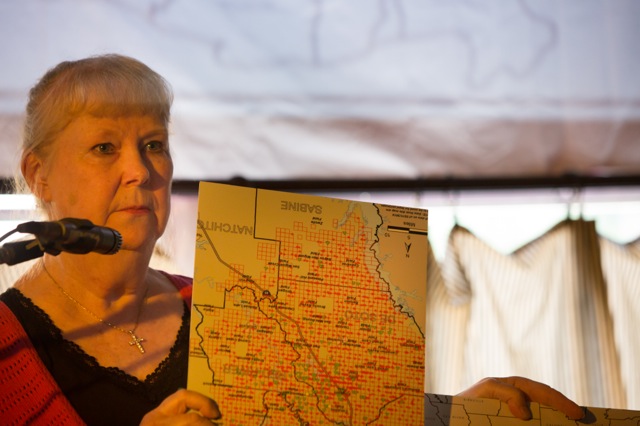
An open letter from the Louisiana Environmental Action Network (LEAN) and the Lower Mississippi Riverkeeper advises those affected by the Santa Barbara Plains All American Pipeline spill not to participate in the clean-up effort.
“We do not want to see your citizens’, workers’, and volunteers’ health harmed in the way we have seen it damaged along our Gulf Coast after the 2010 BP oil disaster,” the letter says.
But the warning may be too late to help some like Osiris Castañeda, a father, ocean lover and filmmaking professor who cleaned up a stretch of Santa Barbara County beach with other volunteers on May 20, the day after a Plains Pipeline spilled an estimated 101,000 gallons of oil into the Pacific Ocean.
A video Castañeda produced with the Youth CineMedia Inc, documents a confrontation between the volunteers and officials who ordered them to leave or face being fined or possibly arrested. An official provided a number for the California Department of Fish and Wildlife office of spill prevention and response , which was giving out passes to volunteers, and told them without the passes they were forbidden to be on the beach. The volunteers called to get passes but, to the group’s dismay, a representative from the agency told them no volunteers were needed.
Video: Refugio Beach Oil Spill by Youth CineMedia
Castañeda told DeSmog he was aware he was risking his health doing the clean up. But finding the beach covered with oil with no cleanup crews in sight made leaving the beach without doing something not an option for him.
“Sometimes you just can’t sit on the sidelines,” he said.
Similar cleanup efforts led by concerned citizens took place following an oil spill in Bangladesh last December, and in Vancouver, British Columbia at the end of April. The public in both places used their bare hands to pick up the oil.
“Nothing has been learned since the BP spill,” Wilma Subra, an environmental scientist and board member of LEAN, told DeSmog. Her first reaction to seeing cleanup volunteers wearing flips flops on Refugio Beach in Santa Barbara County and scooping up oil with their bare hands, was: “Here we go again.”
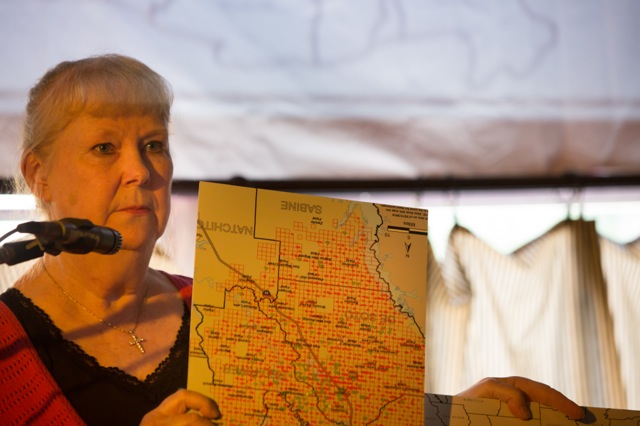 Wilma Subra, environmental scientist and MacArthur award winner, at an educational meeting on fracking in Covington, LA (Photo: Julie Dermansky)
Wilma Subra, environmental scientist and MacArthur award winner, at an educational meeting on fracking in Covington, LA (Photo: Julie Dermansky)
“You have same agencies that responded to the BP oil spill faced with the same problems, yet the response has not improved,” Subra said. “They are still using boom, which does nothing to stop the oil from rolling in on the beach and, once again, health agencies were not included in the response team.”
“My jaw dropped when I saw Santa Barbara residents on oiled beaches, shoveling stranded oil into red buckets,” Riki Ott, a toxicologist who studied the Valdez spill, told DeSmog.
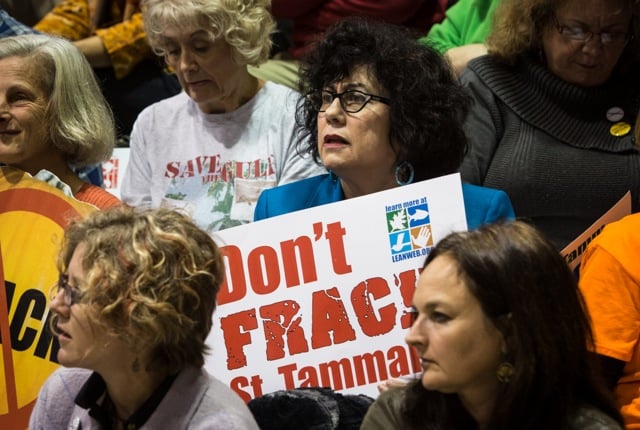 Marylee Orr, executive director of LEAN at a drilling permit hearing in St. Tammany Parish. (Photo: Julie Dermansky)
Marylee Orr, executive director of LEAN at a drilling permit hearing in St. Tammany Parish. (Photo: Julie Dermansky)
“This is what people were doing during the Torrey Canyon tanker oil spill in 1967! That’s what we did during the Exxon Valdez oil spill!” Ott said. “Why are we letting oil companies transport oil without demanding technology that can effectively and safely clean up oil spills? Bare feet. Bare hands. No respirators. We should all know better than this by now.”
Patrick Sullivan, spokesperson for the Center for Biological Diversity, an environmental advocacy group, also believes the response to the Refugio oil spill was inadequate and that cleanup workers should have had respirators.
He points out that it is possible that fracking chemicals or fluids from other extreme oil production techniques like acidization are in the oil. The active drilling platforms off Santa Barbara utilize the Plains pipeline. But no information has been provided if any product from the fracked wells spilled.
Sullivan wonders if state and federal authorities are more concerned about how this cleanup effort looks than protecting the cleanup workers. The CBD identified seven harmful chemicals used in 12 California offshore wells, including Crystalline Silica (X-Cide), Methanol,Glyoxal, Sodium Tetraborate, 2-Butoxyethanol, Merhyl-4-isothiazolin, and Ethoxylated nonylphenol.
Marylee Orr, executive director of LEAN, thinks the absence of respirators is a public relations move. She has no doubt that image played a role in forbidding cleanup workers to use respirators during the BP spill. LEAN provided respirators to hundreds of workers, but they were not used.
“Cleanup workers were told if they used them they would be fired. And now many are chronically ill,” Orr told DeSmog.
Plains All American Pipeline is in charge of the cleanup and the safety of the cleanup workers, according to a representative from the United Command Center. The center includes representatives form Plains All American Pipeline, the US Coast Guard, the US Environmental Protection Agency, California Department of Fish and Wildlife, Office of Spill Prevention, and the Santa Barbara Office of Emergency Management.
During the BP oil spill, BP was also responsible for the spill and workers’ safety. BP also determined workers didn’t need to wear respirators, and the Unified Command went along with BP.
“The Unified Command’s Health and Safety group is overseeing air monitoring and sampling, including real time air monitoring, which takes direct readings for any chemicals in the air, and analytical sampling to determine the presence of any volatile organic compounds in the air,” the Joint Information Center told DeSmog.
Previously, a representative from the center confirmed that an analysis of the oil is underway, but would not give an estimate on when the results would be available.
The Santa Barbara Health Department’s website warns potential cleanup volunteers of possible short-term health risks associated with cleanup activities. There is, however, no mention of potential long-term impacts.
DeSmog asked Susan Klein-Rothschild, media spokesperson for the department, if the agency left out a warning of any potential long-term impacts because it doesn’t think there will be any, and why the Health Department did not also advise volunteer cleanup workers to use respirators?
The agency is concerned about potential long-term health impacts, but “the press release was posted quickly after the spill,” Klein-Rothschild told DeSmog. More information, including possible long-term health impacts, would be available during a public event on May 30 when the public can ask the different agencies involved questions about all things spill related, from health to financial losses, she said.
When asked if waiting to warn the public about potential long-term health risks until May 30 may be too late for some volunteers to assess the risk, Klein-Rothschild didn’t respond.
Neither she nor Takashi Michael Wada, MD, MPH, director of the Santa Barbara Public Health Department, would comment on the department’s stance that cleanup workers are not required to wear respirators because the decision was not in the department’s hands.
DeSmog also reached out to Gina Solomon, deputy secretary for Science and Health at the California Environmental Protection Agency, and asked whether she thought cleanup workers should use respirators or not.
Solomon is a trained medical professional, and has been on the faculty in the Division of Occupational and Environmental Medicine at the University of California, San Francisco (UCSF) since 1997. As a senior scientist at the Natural Resources Defense Council during the BP oil spill, she advocated for cleanup workers to use respirators.
Solomon didn’t respond to our inquiry, although Alex Barnum, California EPA spokesperson confirmed that she received the question. “It would be inappropriate for her to answer because it is outside of her purview,” Barnum told DeSmog. When asked if it is against the rules for Solomon to express her opinion, Barnum repeated: “It was out of her purview.”
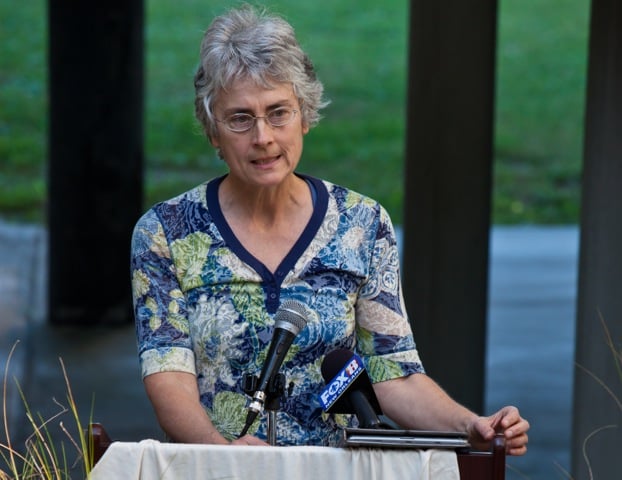 Grand Isle Louisiana, April 20th 2012, Riki Ott, at a memorial for the eleven men who died when the Deep Water Horizon rig blew up on the two year anniversary of the BP oil spill. (Photo: Julie Dermansky)
Grand Isle Louisiana, April 20th 2012, Riki Ott, at a memorial for the eleven men who died when the Deep Water Horizon rig blew up on the two year anniversary of the BP oil spill. (Photo: Julie Dermansky)
“Solomon has got to know that people working unprotected on an oil spill response will get sick – not with colds and flus and headaches,” toxicologist Ott told DeSmog. “Those are just the symptoms of chemical exposure, which if left untreated, can lead to severe and debilitating chemical illnesses.”
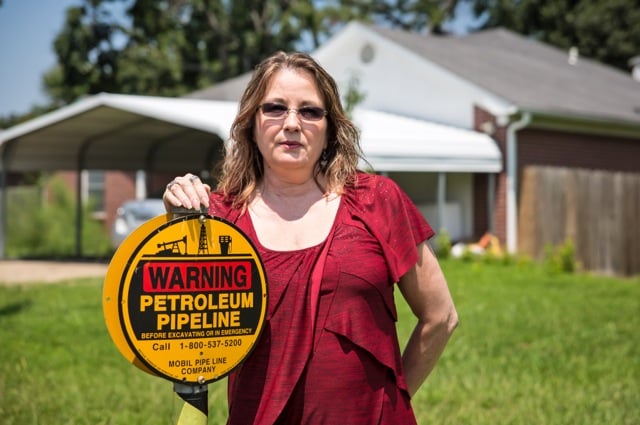 Ann Jarrell in front of her home in Mayflower, Arkansas. The pipeline warning sign was put in after the spill. (Photo: Julie Dermansky)
Ann Jarrell in front of her home in Mayflower, Arkansas. The pipeline warning sign was put in after the spill. (Photo: Julie Dermansky)
When Exxon’s Pegasus pipeline spilled in Mayflower, Arkansas in 2012, cleanup workers and residents were also told the air was safe.
“It makes me sick no one tells the public about the health impacts!” Ann Jarrell, a home owner in Mayflower, inflected with chronic health issues since the spill, told DeSmog. Had she been warned of potential health impacts from the spill, she said she would have evacuated immediately.
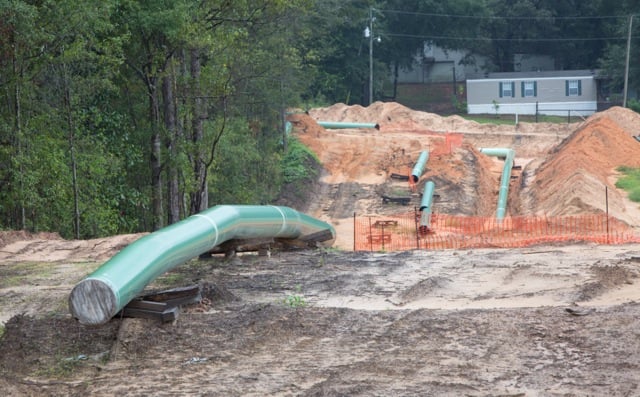 Plains Southcap Pipeline in Semmes, Alabama during construction. (Photo: Julie Dermansky)
Plains Southcap Pipeline in Semmes, Alabama during construction. (Photo: Julie Dermansky)
Mobile Bay Sierra Club Conservation Chair David Underhill wouldn’t be surprised if Mobile is faced with similar problems next. In 2014, Plains defeated opposition to the construction of the Plains Southcap Pipeline through the Big Creek Lake watershed that supplies drinking water to Mobile and the vicinity.
If this pipeline spills, Mobile could be left without a water source. Underhill doesn’t believe anything has changed in the way agencies will deal with a spill since the BP oil disaster either.
The open letter from Gulf Coast survivors to California spill responders warns the public to heed lessons learned from the BP spill, and not to clean up the oil without full protective gear. But despite their warning, Plains All American seems to be following BP’s playbook.
After the BP spill, environmental groups urged the federal government to stop further drilling in the Gulf of Mexico. However, the Bureau of Safety and Environmental Enforcement, an agency overseeing offshore oil and gas drilling operations, recently permitted LLOG Exploration Offshore LLC, to drill a new well near BP’s failed Macondo well.
Now the Center for Biological Diversity is urging the California State Lands Commission to reject a proposal to increase offshore oil operations that would feed crude into the pipeline system that just failed.
Will the commission stop the project that threatens the fragile, now compromised environment or will it follow the lead of federal regulators who permitted another oil company to drill into the Macondo reservoir near where BP did?
In a public apology delivered by Plains in a press release, the company chose to re-use BP’s unpopular slogan. Greg. L Armstrong, the CEO wrote the company plans to “do the right thing.” So far it does not look like thatis what’s happening.
Our most important fundraising appeal of the year
December is the most critical time of year for Truthout, because our nonprofit news is funded almost entirely by individual donations from readers like you. So before you navigate away, we ask that you take just a second to support Truthout with a tax-deductible donation.
This year is a little different. We are up against a far-reaching, wide-scale attack on press freedom coming from the Trump administration. 2025 was a year of frightening censorship, news industry corporate consolidation, and worsening financial conditions for progressive nonprofits across the board.
We can only resist Trump’s agenda by cultivating a strong base of support. The right-wing mediasphere is funded comfortably by billionaire owners and venture capitalist philanthropists. At Truthout, we have you.
We’ve set an ambitious target for our year-end campaign — a goal of $250,000 to keep up our fight against authoritarianism in 2026. Please take a meaningful action in this fight: make a one-time or monthly donation to Truthout before December 31. If you have the means, please dig deep.